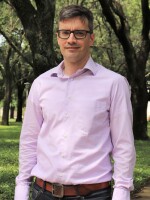Florida tests residents in ways big and small — from the fury of hurricane gusts to the everyday challenges of school and community life. On this episode of "Florida Matters: Live & Local," we hear from people finding ways to stand strong, adapt and support when the pressure hits.
In Pinellas County, a simple lunch hour has become a launchpad for growth through the Lunch Pals mentoring program. Meanwhile, the challenge continues to square away voting rights for former felons.
Lastly, some legacies are carved — literally — into the landscape. Tampa's Rogers Park Golf Course was built by Black golfers in the early 1950s. It became a sanctuary and a community hub when few other places welcomed them. Today, it offers pride and perseverance.
Built to brake wind
(0:00) Houses in this Bradenton development survived a Category 5 storm unscathed. Hunters Point combines solar energy with a hurricane-resistant design. Could these homes set a standard for Florida living? We ask the developer.
GUESTS:
- Marshall Gobuty, Pearl Homes founder and president
- Jessica Meszaros, WUSF anchor and environmental reporter
Kids get a Lego up on life
(12:04) A new school can knock children down, but a mentor can start building them back up in just 30 minutes. This youth minister has spent a decade with Pinellas County’s Lunch Pals program, proving that listening and encouragement are power tools for developing confidence.
GUEST:
- Dean Giancola, Lunch Pals mentor
Former felons’ fight continues
(21:03) In 2018, a Florida constitutional amendment restored voting rights for people with felony convictions. But confusion over fines, fees and political pushback has kept many returning citizens from fully participating in elections. A new book covers the battle and the leaders, like Desmond Meade, who have fought to make their voices heard.
GUEST:
- Daniel Rivero, WLRN investigative reporter and author of “Just Freedom: Inside Florida’s Decades-Long Voting Rights Battle”
A perfect follow-through
(36:00) Rogers Park — Tampa’s first golf course built by and for African Americans in the 1950s — began with hand-carved fairways and holes, sometimes dug with forks and spoons. That humble effort grew into an 18-hole, 162-acre layout that stands as a testament to dedication and community. Its longtime “mayor” shares stories of a legacy that still inspires.
GUESTS:
- Lionel Ballard, co-author of “Rogers Park Golf Course: 18 Holes of History"







